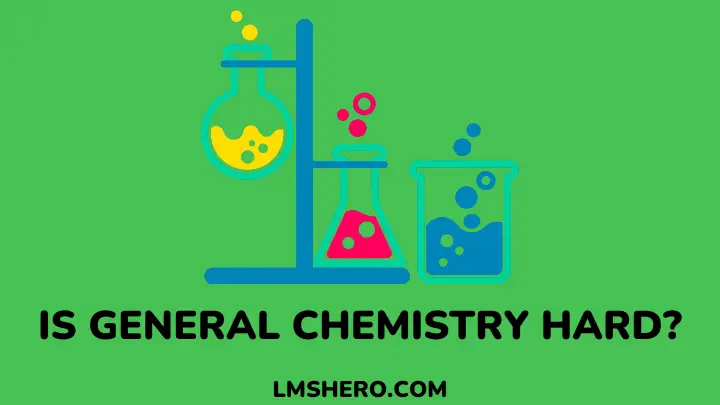General chemistry is one subject that many students dread, even before they actually commence their classes. Mainly because they heard from one or two of their colleagues that it is difficult. But, is general chemistry actually hard?
General chemistry is often considered to be hard because it contains math and algebra which many students find to be too challenging.
However, there are steps you can take that can help you learn general chemistry and minimize the challenges.
This article highlights some of the reasons general chemistry is considered to be hard and some tips to aid your learning experience.
Why is general chemistry considered hard?
There are various reasons that chemistry is considered to be hard. Some of these include;
1. The subject’s broadness
General chemistry is a very broad subject, and it sometimes gets hard for students to grasp all the concepts in the units the course carries. Specifically when it comes to elementary algebra, which many students are already struggling with.
2. Chemistry is progressive
Just like you learned how to write as a kid and still use these writing skills to date, the same can be said about general chemistry. This subject is progressive, and the new curriculum builds on already existing ones.
Topics, principles, or formulas learned, in the beginning, would be used over and over again. Many people try to memorize these principles or formulas in order to aid their experience. Nevertheless, this technique has not proven to be helpful.
3. General chemistry is both mathematical logic and abstract
General chemistry is among a handful of science topics that is both mathematical logic and abstract, and this can be tough for students.
This subject requires a strong understanding of math and algebra (mathematical logic). Additionally, it requires you to learn about electrons, knowing what they do and why they act the way they do (abstract).
You will also need to learn about valence shells and orbitals and their characteristics. These are individually challenging concepts and it becomes more challenging when they are required in just one subject.
Tips to aid your learning experience
Now you know just how challenging this subject can be, let us look at some tips to aid your experience.
1. Get serious from the beginning
This is a very important step you must follow. Remember, I mentioned earlier that general chemistry is progressive, and whatever you learn in the beginning will be used over and over again as you progress.
For this reason, you must ensure you start strong from the beginning of the class. Taking notes of principles, formulas, and concepts that are taught will prove useful as you progress.
2. Study regularly

This step is very obvious but is also very important. Studying regularly helps you build your knowledge of the subjects. Take time out daily or weekly to brush up on what you’ve learned each week.
Do not forget to take note of topics, concepts, or principles that you find challenging or tricky. During your next class, ensure you ask questions on these concepts for more clarity.
3. Stay ahead of your class lectures
This method is generally termed pre-study. Check online to know what your syllabus looks like, and start studying ahead. You can also ask your lecturer for the syllabus or the topic schedule.
After getting these topics, utilize online platforms to get a basic understanding of each topic before class. Try Khan Academy; they offer free videos to learn general chemistry. These videos are broken down to make them easier to understand.
By doing this, each day in class would be interesting as you already have the basic knowledge. It also gives you the opportunity to ask questions about whatever you find challenging during your pre-study.
4. Avoid missing classes
Since general chemistry is a progressive subject, missing any class can prove to be detrimental. Ensure you prioritize your classes.
Even if you miss any due to some unforeseen circumstances, ensure you learn the materials you missed that day. This way, you get to catch up on what was taught.
5. Always go back to your test or exam questions
Always go back to your test or exam materials, especially if you did not score as high as you wanted. Go back to those materials and try to find out which questions you weren’t able to answer correctly.
After identifying these questions, ensure you practice them. Who knows, you may come across something similar again.
6. Don’t hesitate to ask for help if you feel you need to
If you still find general chemistry to be difficult regardless of the effort you’ve put in, then try getting added help. The best option would be either getting a tutor or joining a study group.
These study groups share the same interest as you and might offer you the kind of assistance you need. However, if you prefer one-on-one guidance, then a private tutor would be your best choice.
FAQs
Is general chemistry harder than organic chemistry?
Although organic chemistry tends to be challenging as well, general chemistry is generally considered harder.
What is the hardest part of general chemistry?
The hardest part of general chemistry tends to be algebra and electrons.
Is general chemistry harder than biology?
Yes, it is. Generally, chemistry is to be more difficult than biology.
What do you study in general chemistry?
In this subject, you will study various core courses. Such as; atomic structures, the periodic table, orbitals and electrons, the Lewis-Dot diagram, bonding, charges, geometry, etc.
Conclusion: Is general chemistry hard?
General chemistry is considered to be one of the hardest science subjects. Mainly because it requires strong math and algebra skills.
Nevertheless, it doesn’t have to be the same way for you. The tips highlighted above are guaranteed to make your experience less difficult. Ensure you are committed and put in the appropriate effort in order to make this tip effective.
I hope you find this article helpful, if you did, you should also see what to do with a degree in chemistry.
Thanks for reading.







